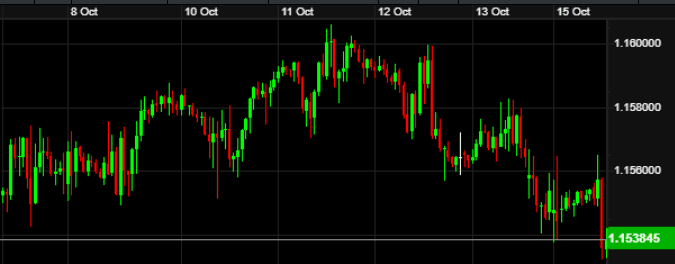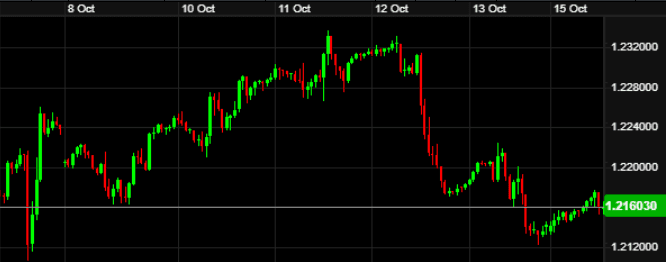ACM Update 16-10-23

As geopolitical tensions escalated in the Middle-East last week, concern spread across financial markets about the far-reaching potential impacts of the war. Economically-speaking, the Federal Reserve may now not be finished with their rate hikes if a shortage of oil drives prices up again, thus further harming inflation. We hear from Fed Chairman, Jerome Powell, on Thursday.
A raft of UK data releases emerge this week also, with the latest on Unemployment, Average Earnings, Inflation and Retail Sales. Will these help with any form of GBP recovery?
Recent UK economic data has continued to be patchy at best and this trend continued last week with UK GDP for August showing a marginal growth of 0.2%. This comes as no surprise to the MPC, who are more than aware that their higher interest rates are harming the economy. MPC member Swati Dhingra commented that the current chances of a recession happening or not are “pretty equally balanced”.
When looking into the data, a lot of the recovery was put down to a bounce back following strike action in the education sector the previous month, alongside some recovery in the services sector. Given many of the previous months had external factors influencing growth (Coronation in May, strikes in June, poor weather in July), this is our first true indication in a while of how the UK economy is accurately performing.
Elsewhere, the latest release from the British Retail Consortium showed growth in the sector but by less than had been hoped (2.8% versus 3.1%). In terms of employment, UK starting salaries (includes those for temporary workers) rose at their slowest in two and a half years. Again, a lot of this is related to a cooling jobs market in the UK, with inflation falling now directly impacting stating salaries.
Meanwhile, the Bank of England Governor, Andrew Bailey, spoke at the IMF’s annual meeting in Morocco. When quizzed about the current stance from the Bank of England, he confirmed that the last policy decision was very tight and expects future decisions to remain that way. He was pleased with the progress on inflation, but noted there is still significant work to do. Expect geopolitical factors to influence the next Bank meeting, on 2nd November.
Sterling continues to trade relatively sideways against the Euro, with barely half a per cent worth of movement between the two last week. Both sides of the channel remain lacklustre in recent figures. With a number of releases this week, we can expect GBP movement to be very much data-dependent, with the figures giving a glimpse as to what is to come for the overall economy.
Recent moves in GBP-EUR can be seen here:

On the Dollar front, geopolitical tensions were very much front and centre. Events in the Middle East continued to drive price swings in assets such as oil, gold and also the Swiss Franc in Friday trading. After weakening off mid-week to its worst against GBP in three weeks, the Dollar was somewhat on the back foot prior to the latest US inflation news arriving on Thursday.
Indeed, the US inflation release of 3.7% for September, mirrored the August number of the same figure. This is largely down to fuel prices remaining high, which wont be helped this month either by the recent Israel conflict. This drove Dollar strength on Thursday afternoon as investors saw an increased likelihood of a further rate hike coming from the Federal Reserve.
Cable (GBP-USD) fell by over 1% on the renewed Dollar resurgence in a matter of a few hours. With the next meeting of Powell and co coming up on 1st November, the potential of a further (and possibly final) rate hike looks to be rising. That will be largely dependent on geopolitical events between now and then.
In fact, the minutes of the last Fed meeting were released last week also, on Wednesday evening. No major surprises here, in the respect that the US economic path is still “highly uncertain” and that ongoing data will determine whether a future hike is needed. The picture has changed somewhat since the mid-September meeting though. The committee will continue to “tread carefully” towards its goal of bringing inflation under control.
The Dollar is looking likely to remain strong for now, especially against other major currencies. Recent moves on GBP-USD can be seen in the chart below:

A quieter news week for the Eurozone once more, with German Final CPI numbers showing inflation continued to grow at a rate of 0.3% (month on month) from August to September. This is the fourth month in a row recording the same steady growth of 0.3%.
ECB President Christine Lagarde was also at the IMF’s annual meeting in Morocco. She commented that the bank still believe there is some lag to come from their previous rate hikes and will keep policy tight for as long as needed. No changes there, and indeed a very similar rhetoric as with many of the central banks of late, as geopolitical uncertainties remain.
Meanwhile in Australia, the historic vote on whether to amend the constitution to give greater rights to Indigenous people, ended in a “No” outcome, by roughly 60:40. Despite being politically divisive, there has been little movement in early trade for the Australian Dollar this morning.
The week ahead:
Monday – Rightmove HPI (00:01 UK time), Bank of England Chief Economist Huw Pill speech (09:30), New Zealand CPI inflation (22:45)
Tuesday – Australian MPC Minutes (01:30), UK Unemployment/Claimant Count/Average Earnings (07:00), MPC Member Swati Dhingra speech (10:05). US Retail Sales (13:30).
Wednesday – UK CPI inflation (07:00), Eurozone Final CPI (10:00), Federal Reserve Beige Book (19:00)
Thursday – Australian Unemployment Rate (01:30), US Unemployment Claims (13:30), Federal Reserve Chairman Jerome Powell speech (17:00).
Friday – UK Retail Sales (07:00)
Into a new week and geopolitical events will undoubtedly remain a big factor in market movements, especially for safe-haven currencies such as the US Dollar and Swiss Franc.
Outside of this, as already mentioned there are a number of sterling data releases this week. Whilst currently rangebound versus the Euro (and to an extent the Dollar), any further suggestions that the Bank of England will need to hike interest rates will be drivers of GBP. That said, last week’s GDP data suggests that Bailey & Co aren’t really in a position to be strangling the economy with even higher interest rates currently.
Thursday’s speech from Jerome Powell will also be a major focal point, for similar reasons on the US side of monetary policy. For Dollar buyers & sellers therefore, Wednesday and Thursday’s data releases will be crucial.
For any pending requirements, ensure to reach out to the team and we are here to assist.
Have a great week.